What we Likes and Dislikes | Spanish: Beginner A1 Level - Class 6 PDF Download
| Table of contents |

|
| What is it that you like/dislike? |

|
| Saying that you like something |

|
| Saying why you like it! |

|
| Positive adjectives |

|
| Saying what you dislike |

|
| Negative verb constructions |

|
| Sitting on the fence |

|
What is it that you like/dislike?
Remember, when you’re saying what you like and dislike, you can refer to various things. You can talk about a noun:
No me gusta la música pop. - I don’t like pop music.
You can talk about an action (a verb):
No me gusta nadar. - I don’t like swimming,
You can talk about an idea or concept. This might require the subjunctive!
No me gusta que me mientas tanto. - I don’t like that you lie to me so much.
Saying that you like something
Let’s start with your ‘gustos’ (likes)! There are several phrases that you can use to say that you like something. Most of them are constructions with verbs.

A lot of these constructions can confuse students a bit, because they’re not as simple as ‘I like X.’ Instead, they take the form of ‘X pleases/amuses/fascinates me.’
When we learn basic sentences in Spanish, we often use a simple subject-verb(-object) word order, like in these examples:
When we throw in some indirect object pronouns, things get a little more sophisticated.
(If we want to, we can add a part that emphasizes who the ‘recipient’ of the action is, for example, ‘Yo te hablo a ti.’ If you want to know more about direct and indirect object pronouns, we’ve got you covered!)
‘Gustar,’ which means ‘to please’ is just a verb like any other; don’t be intimidated by it! The reason students get confused is that it gets mistranslated as ‘to like.’ Technically, ‘gustar’ does not mean ‘to like.’ It means ‘to please.’ If X pleases Pedro, then Pedro likes X.
Let’s use the verb gustar to begin with, to see what happens when we use verbs with indirect object pronouns. You can have a lot of fun switching up the word order here!
*Some of the sentences are grammatically unnatural (so we recommend you don’t use them), but they help with explanation, so bear with us!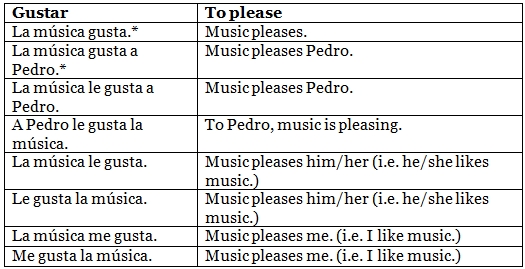 You can see that it’s very unnatural to say things like, ‘To Pedro, music is pleasing.’ And that’s why we translate it as ‘Pedro likes music.’ So if you’re ever confused about word order, remember that ‘to like’ is a figurative English translation, but that ‘gustar’ actually means ‘to please.’
You can see that it’s very unnatural to say things like, ‘To Pedro, music is pleasing.’ And that’s why we translate it as ‘Pedro likes music.’ So if you’re ever confused about word order, remember that ‘to like’ is a figurative English translation, but that ‘gustar’ actually means ‘to please.’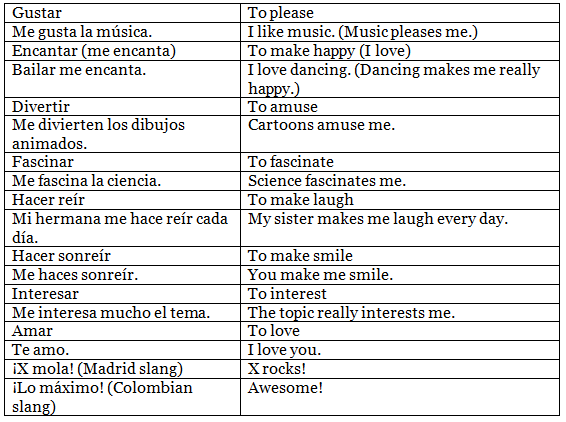
Saying why you like it!
Once you’ve said that you like something, it makes sense to justify your opinion with a reason.
First off, you’ll need some ways to say ‘because.’
Here’s a list of positive adjectives to describe a thing that you like.
Positive adjectives
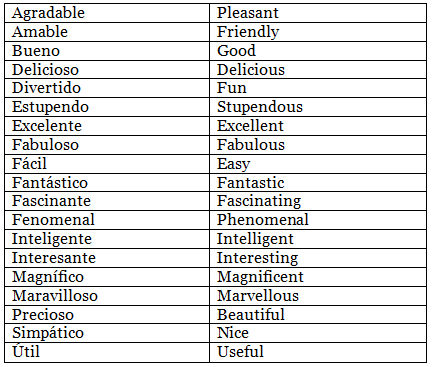
Saying what you dislike

None of us can pretend to like everything. It’s just as important to be able to express what you don’t like. So, let’s look at how to describe your ‘disgustos’/‘aversiones’/‘antipatías’ (dislikes)!
Negative verb constructions
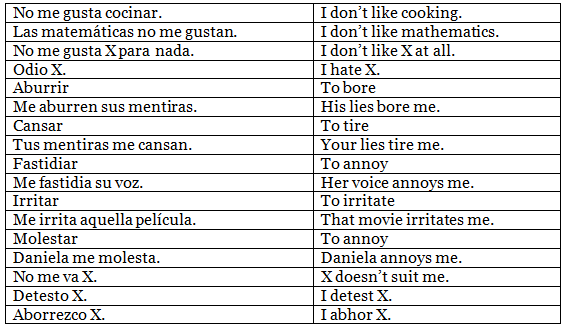
And here are some negative adjectives to explain why you dislike something!
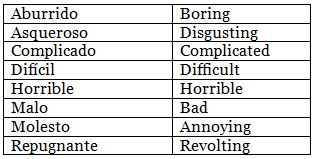
If these are too strong for you, then you could use the word ‘demasiado’ with a more neutral adjective. It means ‘too.’ For example,

Sitting on the fence

Sometimes you don’t necessarily like or dislike something. Here are some phrases to use for those in-between situations:

|
33 videos|38 docs|28 tests
|














